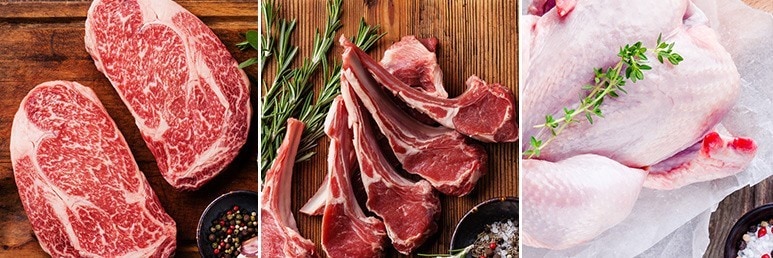4 Essential Tips of Making the Perfect Roast
Here’s all you need to know about prepping and cooking a great roast.
It’s hard not to love a good roast. A wildly popular affair in the UK, the Sunday roast isn’t just a meal lovingly prepared by mothers in the home kitchens anymore. Now, both professional restaurants and hotels have adopted the concept of the roast, shooting it to global fame. Sunday lunches have replaced the popularity of Saturday afternoon dining, and the meal is distinctly the preferred choice when special occasions such as Thanksgiving and Christmas roll around.
So, what is a roast exactly? It’s essentially a dry-heat method of cooking meat in an uncovered pan, which helps to retain natural juices within the meat while giving it a crispier exterior.
Curious yet? Here’s how to plan for a fail-proof roast.
1. Choose the right cut of meat.
You can do a traditional roast with either beef, lamb or chicken.

Beef
For beef, the ribeye roast is the most popular choice. One of the more tender cuts, the ribeye is generously woven with marblings of fat to ensure that you get rich, juicy slabs of meat. If you can’t get your mitts on the ribeye, the loin (strip loin and tenderloin) and the rump are also good options.
Lamb
If you’re roasting lamb, the leg is the prime cut, serving up a good amount of lean, tender meat. The shoulder and the rack are also commonly used for roasting.
Chicken
Choose a high-quality organic chicken that might be pricier but would guarantee a lot more flavour. Try to buy a smaller-sized chicken as that would cook more evenly during the roast.

2. Marinate to tenderise the meat.
Everyone knows that the marinade is the secret to obtaining greater flavour, but few realise that it also helps to tenderise the meat.
Create a cocktail of garlic, thyme, rosemary, cloves, cinnamon and chilli, and mix with red or white wine, or even beers.
Slather the entire piece of meat generously with the mix and let it sit for a minimum of eight hours in the refrigerator.
3. After marinating, let the meat rest to avoid shock.
After you’ve let the marinade sink into the meat or fowl (overnight, preferably), you’ll want to take the meat out for at least an hour before sticking it in the oven. This helps the meat acclimatise and reduces the amount of shock it gets from the sudden rise in temperature.

4. Don’t over-roast. Let the meat rest again to keep it juicy.
Once you’re done with your prep work, lay the meat on top of an assortment of aromatics (you can use carrots, scallions, leeks, celery, thyme, garlic and rosemary). Set the oven for 175°C, but pause for some quick math; you’ll need 20-30 minutes of roasting time for every 500 grams of meat to achieve the perfect roast. So, if you had a piece of meat weighing roughly 1 kilogram, it should be in the oven for at least 50 mins.
When the timer’s up, let the meat rest for a minimum of 5-10 minutes. This helps to keep the meat juicy. Cutting into it immediately would force all the juices to flow outwards, leaving you with a dry, rather undesirable dish. By letting it rest, you make it easier to carve later on.
Top recipes
A perfect combination between the greasiness of duck, corn cream, honey and the elegant aroma of lavender flowers will definitely satisfy your diners.
Back to Western at Your Fingertips